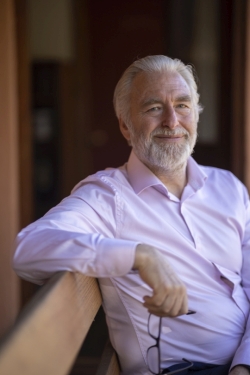Transform your school culture and deliver extraordinary educational outcomes
by building new levels of trust, collaboration and community
as you master the skills of Powerful Conversations.
Our Powerful Conversations methodology offers a fresh approach to school leadership and collaboration grounded in philosophy, linguistics, and biology. Proven effective in schools and the public service, our methodology helps you become a more astute observer of human interactions and skilled communicator. The subtle yet profound changes you’ll make to your everyday conversations will shift the trajectory of your school culture and empower your team to exceed expectations.
Past participants have reported substantial improvements in their ability to give and receive feedback, get delegated work done on time, resolve conflicts and complaints, and manage their own moods. They reported being better equipped to deliver on the values, behaviours, and strategic plan of their school.
With our approach, you and your team can shift your being and presence as leaders through ‘second-order’ learning, expanding what you see as possible. We use experiential and action-based learning approaches and work with schools that recognize the value of extended engagement. Over a period of three months, you and your leadership team will participate in interactive webinars, in-person workshops and learning conversations with a buddy; learn to observe and influence the interactions of your team in new ways; resolve long-running frustrations; and get your school’s Annual Implementation Plan back on track.
Your enhanced skills for leadership and interaction will enable you to design and implement ongoing innovations in how you and your people work together so you can better deliver the education outcomes you are committed to – and our communities desperately need.
“Before this program if an exec came and spoke to me I would be doing 7 other things at the same time. This program has made me think about what else I am doing and am I giving that person 100% of my attention. The result of this is an increase in the feeling of worth by staff as well an increased willingness to engage in important conversations.”
Ms Deputy Principal

Humans are conversational beings that get things done and create the future through conversations. On reflection, we see that leadership, management, and collaboration are fundamentally conversational activities.
We help you distinguish and build competency in a set of fundamental conversational and relational skills that underlie the actions of leadership, management and collaboration.

I have attended many management training sessions and your leadership training is one of the very few that I believe adds real value. Most other management trainers focus on wishy-washy high-level aspects of management that result in attendees losing interest, and they often struggle to pay attention. Your sessions break-down each component of leadership into small, simple, very practical steps that everybody can identify with. The best aspect of the training is that you engage all of the trainees in a way that is interesting and non-threatening.

The “elements of conversations” framework is an interpretation that deconstructs the conversational nature of leadership and collaboration to identify specific, learnable and actionable skills in eight core areas: listening, speaking, moods (and emotions), speaking, physiology, trust, learning, relationships and commitments.
In our interpretation, conversational proficiency is being able to fully utilise the key elements of conversations to generate quality communication and constructive workplace relationships. We believe that many leaders and collaborators are achieving their current success despite lacking a high level of competency in many of these elements. We believe that if school leaders enhanced their conversational proficiency, they could transform school cultures and educational outcomes.
“I had to help coach a staff member on their performance, specifically related to classroom management and relationship building. I was able to focus more on what was possibly going on in the background for a staff member, [ …] This allowed me to better develop solutions through coaching, rather than simply identifying weaknesses.”
Ms School Leader

- Coordinate action with effective requests, offers, and promises; Utilise ‘conversations for action’.
- Have feedback be welcomed by distinguishing facts and judgements while getting in resourceful moods such as curiosity.
- Reduce time and energy wasted in conflict by working with the differences between assertions, assessments, and the “Truth”. (Too often, we confuse our story or explanation of what happened with the observable facts of what happened and then argue that our ‘story’ is the Truth of what happened.)
- Make more effective decisions, project authority and create new futures by mastering personal and social declarations.
“I had a situation where I was receiving work that was not what I had requested. Instead of blaming the provider, I reflected upon what I had actually asked for and how I would make my expectations clearer. This promoted a greater understanding of exactly what I required, and the work then provided was what I needed.”
Executive Level (EL2) Public Servant

Learn the ‘secrets’ to no surprises – that is getting work reliably delivered on time and to standard (or learning in advance if that will not happen)!
- Use the conversations of promise management for effective delegation and coordination of work outside hierarchies.
- Manage the inevitable ‘breakdowns’ or disruptions to the expected workflow while keeping good humour.
- Generate satisfaction for yourself and those you work with.
- Improve educational outcomes by making bigger commitments and managing them without anxiety or over-seriousness.
Return on investment
Participants report a team-productivity increase of 14% (with a range of 10% to 20%) based on the reported results of 26 executive-level public servants.
If your staff could increase their (non-teaching) productivity by 14%, what would that be worth in money, time and well-being to your staff and school?

What would you say to a colleague who asked you whether they should do this program?
I would say it is a valuable and comprehensive program that offers realistic approaches. The information gained has significance in the real world and it is easy to see how the strategies can be applied to make you a more open, honest and pragmatic leader.
I would tell them it is a valuable program and they will get a lot out of it.
I would recommend it. The skills and tools are practical and applicable to conversations across all aspects of life- not just the workplace! Ian is a warm and patient presenter who can draw out and facilitate discussion.
I think if that person was aiming for any leadership program the knowledge and different way of thinking about things [in this program] would be very beneficial to their skills and development as a leader. I would highly encourage them to participate in this.
It is a great program, that will help develop your leadership capacity.
Having the opportunity to work with your team to jointly construct knowledge and understanding communication is invaluable.
I would strongly recommend the program to anyone. This is great leadership training.
Certainly worthwhile, but only if you make the commitment in time.
I would positively support the program and recommend colleagues take the opportunity to engage with colleagues, reflect on their leadership and learn to identify processes which would support the team to improve and be a more collaborative, as well as improve whole school culture.

What would you say to a colleague who asked you whether they should do this program?

I would say it is a valuable and comprehensive program that offers realistic approaches. The information gained has significance in the real world and it is easy to see how the strategies can be applied to make you a more open, honest and pragmatic leader.
I would tell them it is a valuable program and they will get a lot out of it.
I would recommend it. The skills and tools are practical and applicable to conversations across all aspects of life- not just the workplace! Ian is a warm and patient presenter who can draw out and facilitate discussion.
I think if that person was aiming for any leadership program the knowledge and different way of thinking about things [in this program] would be very beneficial to their skills and development as a leader. I would highly encourage them to participate in this.
It is a great program, that will help develop your leadership capacity.
Having the opportunity to work with your team to jointly construct knowledge and understanding communication is invaluable.
I would strongly recommend the program to anyone. This is great leadership training.
Certainly worthwhile, but only if you make the commitment in time.
I would positively support the program and recommend colleagues take the opportunity to engage with colleagues, reflect on their leadership and learn to identify processes which would support the team to improve and be a more collaborative, as well as improve whole school culture.

About our senior coach, Ian Higginbottom
Ian partners with senior executives and school leaders to develop highly effective working relationships, create high-performing teams and generate cultures in which people thrive.
Ian brings to his coaching his own lived experience building and developing teams as a business leader, senior executive and community developer. He started his career as a scientist before founding a successful software start-up and a joint-venture cooperative housing development. He is an extensively trained coach, holding a Graduate Diploma in Ontological Coaching, certification from the Institute for Generative Leadership and a qualification in conflict coaching. He is a Professionally Credentialed Coach (PCC) with the International Coaching Federation.
Ian’s coaching methodology is powerful – he cares about producing results and cares about people. He works with successful people who want to deliver significant results while living deeply satisfying and meaningful lives.
His scientifically and philosophically grounded methodology develops teams’ capabilities by shifting the fundamental drivers behind behaviours, skills, and the ability to learn and adapt. His approach leads to positive changes that last and become self-generating.
In the past five years, Ian has coached over sixty-five senior executives (SES officers) in the Australian, ACT, Victorian and NSW public services and coached twenty-two school principals or leadership teams. He has also coached senior executives for school improvement in the ACT and Victorian Education Departments and coached at the Deputy Director General (Dep-Sec) level in the ACT Education Directorate using tools and approaches included in the Powerful Conversations Program. He brings to schools the breadth of his experience working in business and coaching public servants, in addition to his experience working with school and senior education department leaders.
“The Powerful Conversations program can radically improve the quality of working relationships and the effectiveness of human interactions in schools so that educators can spend more time educating and less time chasing up work and dealing with frustrations and unnecessary disruptions. As one principal said to me, ‘We are not really trained in leadership or how to work together effectively – we need this.’ I think communities are crying out for schools to deliver better outcomes for students, and that can only happen when educators have better skills to lead, collaborate, innovate and take care of each other. I want to see principals, school leaders and educators feeling less stressed, more satisfied and more peaceful – getting more done with less effort.” Ian Higginbottom
